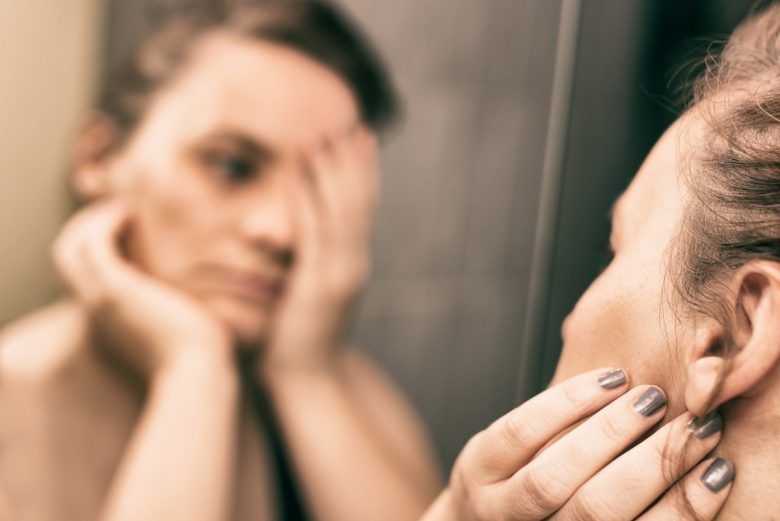
You want your child to love their body, and it’s troubling when they don’t.
“I worry about my oldest daughter. She says how fat she is. We have purchased cute clothes that she loves but she compares herself to others and their body shapes and sizes. What can I do to better support her?”
In this episode, Carol and Anne share useful tips to help your child swim against the tide of self-criticism. If your child is nearing 12 years old, or is already in the teen years, you need to listen to this episode.
This episode’s Parenting Practice
This episode is full of information. Listen, use it, and invite your children to use it as well. Then write out this affirmation and put it in the family bathroom: “When I look in the mirror, I see a healthy and fit body that I love.” What you put your attention on, you create more of.
Transcript of podcast episode
Carol: She’s now showing me she is just doing what the norm is, which doesn’t have to be our norm, her norm.
Welcome to The Child Whisperer Podcast. I’m your host, Carol Tuttle, author of the best-selling parenting book, The Child Whisperer. I’m with my co-host, Anne Tuttle Brown.
Anne: This week’s question comes from a Type 3 mom. I worry about my oldest daughter. From the beginning of reading The Child Whisperer, we both knew she was a Type 1, without question. But I worry because she will say how fat she is. We have purchased cute clothes that she loves but she compares herself to others and their body shapes and sizes. What can I do to better support her?
Carol: I think it’s important to acknowledge that in the phase of life she’s in, the age she’s in, what starts to kick in, I talk about this in The Child Whisperer, because they go through the developmental stages for each child. Each Type has this birth-to-age-18 experience of developing and their emotional needs being met. At her age, she needs to feel like she fits in with her peer group. Now, our oldest daughter, Jenny, Type 1 also, came home from school, about the same age in her life.
Anne: Early teens.
Carol: Early teens, preteens, and started to tell me how fat she was and she didn’t like her body. Now, rather than seeing this as something Jenny was choosing or it was really a belief she was claiming for herself, I recognized she was picking up on this at school.
Anne: The cultural practice?
Carol: Yes, now she was starting to practice what was the norm. And with my background now of understanding what I call the psychology of fashion and where the whole shame and negativity in our culture of women comes from, it starts at this age. It’s a part of the cultural wounding. There is this conversation that goes on with girls in that age group that is about shaming their bodies. Rather than see it as Jenny doing it, I thought she’s now showing me she is just doing what the norm is, which doesn’t have to be our norm, her norm.
Anne: Had you fallen into the cultural norm? Were you practicing looking in the mirror and seeing that?
Carol: Well, at that point?
Anne: At that point.
Carol: Yeah, yeah. I mean, this would have been… I was doing enough healing work at that point to understand that if I projected negativity on my body…
Anne: So you weren’t practicing that anymore but you definitely had?
Carol: I don’t know if I was 100% clean of it like I am now, but I was active in this conversation with myself to say, “I’m going to create what I don’t want by projecting this negativity on my body.” And I’m not going to change what I want to change if I shame my body and my appearance. And I did recognize that in my early days by age 12, 13, that’s when I had started it. I understood the whole kind of evolution of body shaming, and the female conversation was that earliest time period is when we started it. So I took it upon myself to help Jenny see the bigger picture and say, “Do you hear your friends talking like this? What’s the conversation you hear at school?” I said, “We have a choice to be a part of that or to choose something different, and to create what we want and to create a healthy body image. I want to support you in that.” She agreed and it became a practice of ours that if she just mistakenly forgot and would make a comment like that, I’d support her by, “What else? What do you want? What else could you say about your body?” And the truth was, she wasn’t fat. She didn’t have a body that she needed in any way feel bad about. I mean, some girls deal with weight issues and there are things that would be in their best interest to change. You want them to start loving what is and…
Anne: That’s a better place to start anyways for anyone.
Carol: Yeah, getting a positive experience with their body rather than a negative one. It’s going to then be decades. I recognize my mother’s pattern with this. She was saying up in through my teens to early adult years when I spent more time with her. She’d see another woman on the street that she thought looked heavy from the backside. She would say to me, ask me this question, “Am I as big as her?” And as I got smarter in my maturity, I started to recognize how useless this question was. And it was a comparison and it was just, again, trying to get feedback on, “Am I okay the way I am?” You know, what do you say to your mom? “No, actually, you are bigger, Mom.” You tell her what she wanted you to say, which, “No, you are not. You look fine.” And that’s not…
Anne: Yeah. Well, Grandma, even as she got thinner, she’s always, “Oh, my hair.” She is always apologizing for how she looks.
Carol: Her appearance has been a huge thing. So you can see in the decades how in the generations, it’s gone from being sort of a ridiculous thing that shut women down, that all these criteria for it to be acceptable as a female are so based on appearance, to now, let’s choose to be healthy, strong women with self esteem that then chooses to create a beautiful appearance. It’s a byproduct of something much deeper. It doesn’t create the other.
Anne: You and Jenny were such a good example of that. Kind of cleaned up the way for me. I remember being in gym class in about seventh or eighth grade. There was a girl looking in the mirror, “Oh, my butt is so big. I’m so fat.” She was probably like 4’8″. She was like 13. She was so little and she weighed 90 pounds, and I was like, “What?” And I just remember thinking of what you had taught me, and I was so grateful that I wasn’t a part of that.
Carol: Yeah, I even…I probably in your case because I hadn’t caught it with Jenny, I was sort of like, now you are in it and now we gotta work with…I had to kind of open her eyes and her mind to this. You now were at the benefit of that and you were learning these things that you didn’t have to participate in that sort of collective experience of your peer group.
Anne: And if you’re a mom listening, what’s your conversation about yourself? There are some things that you need to change.
Carol: And are you asking your children to reassure you about your body and appearance? Really not a healthy thing. So watch your own words. What you are saying about your body, your appearance, that’s putting yourself down?
Look at your family history. Is this generational? Do you come from a family system where women have just, generation after generation, chosen to shame themselves and their appearance? Be the one to stop that. Teach your daughters how to love their bodies.
And third, support a healthy food experience so that your children have skill sets to create healthy bodies. That it’s not this, “Well, you either get one or you don’t.” It’s really in your hands if you want your body to be healthy, unless there is some deeper condition going on or disease or ailment. But we are talking about generally speaking, you have a choice to create the health and to help your children learn. And it comes first from choosing to love your body now. Be a role model as a mother, to love your body now. Because even if you are not saying anything about it, it affects your self esteem. And you are not the best parent if you start the day with a negative interaction with yourself while you look in the mirror. That does not uplift you. It does not instill positive energy. It takes you down. It pulls on you.
Couple of resources I highly recommend that you can even involve your daughter in, that will really, really shift this inner conversation and self perception from a negative to a positive, is in the Carol Tuttle Healing Center. I have a four-week healing plan on healing plan for weight and body issues. A lot of that’s generational that we are cleaning up so that you can have a different experience with your body and your health.
Then also if you go to YouTube, on my YouTube channel, I have a really great video, Top 10 Affirmations for Weight Loss. Those are key phrases to memorize, to learn, that you want to have in your mind and in your vocabulary because it just supports creating that positive experience.
Teach your daughters that they’ll be the exception, not the norm, most likely, in their peer group. Do they need to correct and help guide their peers? Depends on that personality and what Type your child is if they want to take upon themselves that role. I never felt like my daughters had to try and correct their peer group. I just wanted them to own this for themselves and not feel they had to comply to whatever the peer group conversation was. You have that experience where you noticed you were creating a different experience than kind of the common conversation girls had.
Anne: I was so grateful. I didn’t necessarily call them out or say, “Well, no, look how skinny we all are. We look great.” I just kept it more of a personal thing and knew that what was true for me. I’m very grateful that these affirmations have been something that have supported me throughout my life.
As I continue to use them and develop them and train my mind, it is what I experience, is love for my body. Your parenting practice this week is to use this information. Invite your children to use it as well. This is one of the affirmations taken from your YouTube video, and it is, “When I look in the mirror, I see a healthy and fit body that I love.” You can even write this out, put it in the bathroom, in a public family bathroom where everyone’s going. You can put it on the mirror where you can see it. You can put it on the fridge and you could enroll your family together to use this affirmation this week.
Carol: I like that idea. Whatever bathroom the kids use, put a different affirmation up each week for them to read while they are in there. That’s great. Some people might say, “Well, when I look in the mirror, I don’t see that healthy fit body.” Well, you are creating that. What you put your attention on, you create more of. And so, as you choose to have that belief and that in your vocabulary, you inspire and support your body and creating that outcome. It influences your choices with what you eat, your activity levels. It changes things because it’s become your personal mantra and the declaration now that influences so many experiences than when it comes to your body and its fitness level. Thanks for listening. For more support, go to thechildwhisperer.com, where you can purchase the book, subscribe to our weekly parenting practice email and find a transcription and audio of “The Child Whisperer Podcast.”
Anne: If you are listening on iTunes, thank you for leaving your review. If you have a parenting question, please send it to [email protected].



